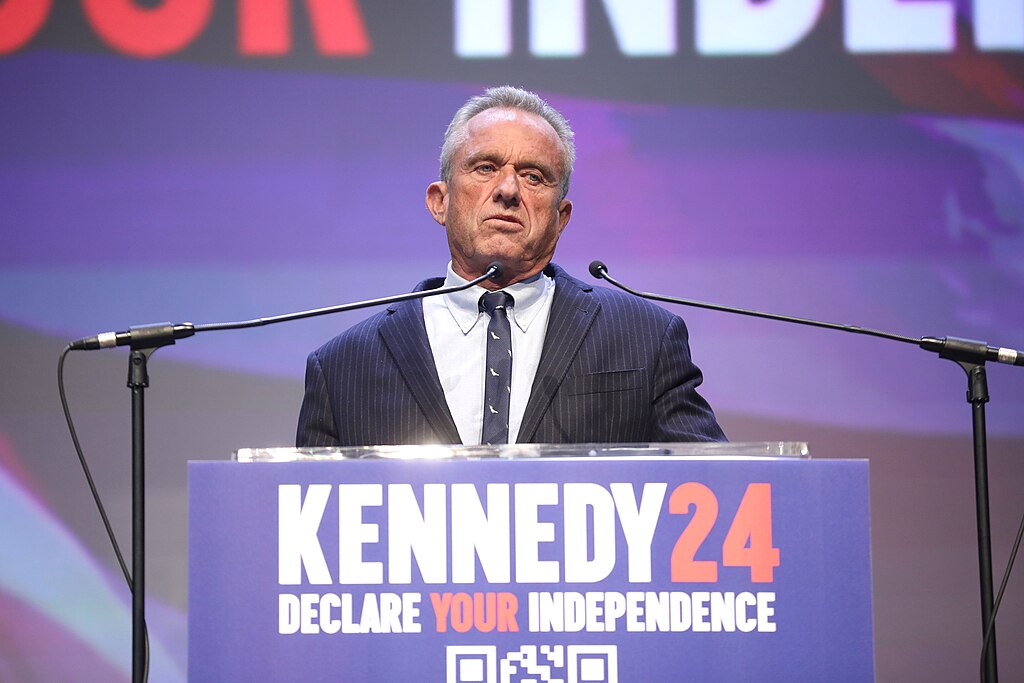The U.S. Supreme Court has decided not to remove Robert F. Kennedy Jr.'s name from the presidential ballots in Wisconsin and Michigan, marking the latest legal setback for the former candidate. Kennedy, who previously withdrew his candidacy and endorsed former President Donald Trump, argued that keeping his name on the ballot was a violation of his First Amendment rights, which protect against compelled speech. He contended that his supporters could face confusion and frustration as a result of his forced appearance on ballots, complicating the election dynamics in these battleground states.
Kennedy’s appeal to the Supreme Court came after a series of denials from both state and federal courts. Wisconsin and Michigan, having already printed ballots with his name, resisted changes that could interfere with the voting process just weeks before Election Day. The election authorities argued that making last-minute adjustments, such as placing stickers over Kennedy’s name on the ballots, would create “chaos” and increase the risk of voter confusion.
The Wisconsin Election Commission emphasized the logistical challenges of altering ballots at this stage, noting that millions of ballots had already been distributed or submitted. According to Michigan Secretary of State Jocelyn Benson, ballot modifications would now be virtually impossible, citing the volume of completed votes. The courts also rejected Kennedy’s proposed sticker solution for Wisconsin ballots, asserting that implementing this at scale was unfeasible without causing disruptions.
Kennedy argued in his legal filings that requiring him to appear on the ballot “forces him to campaign against his own will,” a claim that received limited support in the judiciary. The Sixth Circuit Court of Appeals previously rejected his request, reasoning that his claims did not satisfy the legal standards required to overturn the earlier decisions and had already been addressed in previous litigation.
Notably, Supreme Court Justice Neil Gorsuch dissented, expressing support for removing Kennedy’s name from the Michigan ballot, aligning himself with the views of three conservative judges on the Sixth Circuit Court who believed that the Michigan Secretary of State should have taken Kennedy’s name off the ballot. However, this opinion did not sway the court’s final decision, which left Kennedy’s name on ballots in both states.
This legal decision underscores the complexities of managing election protocols and candidates’ rights in tight timelines. The ruling now locks in Kennedy’s name for voters in both states, a presence that could influence the outcome in these key battleground regions. While Kennedy’s name remains, the Supreme Court’s decision aligns with the “Purcell principle,” a judicial doctrine that discourages last-minute changes to election procedures that could potentially disrupt or confuse the voting process. For Kennedy, however, this could mean facing the very scenario he sought to avoid — a nominal campaign without his active participation.



 New York Legalizes Medical Aid in Dying for Terminally Ill Patients
New York Legalizes Medical Aid in Dying for Terminally Ill Patients  Trump Signs Executive Order Threatening 25% Tariffs on Countries Trading With Iran
Trump Signs Executive Order Threatening 25% Tariffs on Countries Trading With Iran  Nighttime Shelling Causes Serious Damage in Russia’s Belgorod Region Near Ukraine Border
Nighttime Shelling Causes Serious Damage in Russia’s Belgorod Region Near Ukraine Border  Trump Signs “America First Arms Transfer Strategy” to Prioritize U.S. Weapons Sales
Trump Signs “America First Arms Transfer Strategy” to Prioritize U.S. Weapons Sales  Trump Lifts 25% Tariff on Indian Goods in Strategic U.S.–India Trade and Energy Deal
Trump Lifts 25% Tariff on Indian Goods in Strategic U.S.–India Trade and Energy Deal  Trump Allegedly Sought Airport, Penn Station Renaming in Exchange for Hudson River Tunnel Funding
Trump Allegedly Sought Airport, Penn Station Renaming in Exchange for Hudson River Tunnel Funding  Ohio Man Indicted for Alleged Threat Against Vice President JD Vance, Faces Additional Federal Charges
Ohio Man Indicted for Alleged Threat Against Vice President JD Vance, Faces Additional Federal Charges  Netanyahu to Meet Trump in Washington as Iran Nuclear Talks Intensify
Netanyahu to Meet Trump in Washington as Iran Nuclear Talks Intensify  Trump Allows Commercial Fishing in Protected New England Waters
Trump Allows Commercial Fishing in Protected New England Waters  Missouri Judge Dismisses Lawsuit Challenging Starbucks’ Diversity and Inclusion Policies
Missouri Judge Dismisses Lawsuit Challenging Starbucks’ Diversity and Inclusion Policies  U.S.-India Trade Framework Signals Major Shift in Tariffs, Energy, and Supply Chains
U.S.-India Trade Framework Signals Major Shift in Tariffs, Energy, and Supply Chains  U.S. to Begin Paying UN Dues as Financial Crisis Spurs Push for Reforms
U.S. to Begin Paying UN Dues as Financial Crisis Spurs Push for Reforms  Trump’s Inflation Claims Clash With Voters’ Cost-of-Living Reality
Trump’s Inflation Claims Clash With Voters’ Cost-of-Living Reality  Norway Opens Corruption Probe Into Former PM and Nobel Committee Chair Thorbjoern Jagland Over Epstein Links
Norway Opens Corruption Probe Into Former PM and Nobel Committee Chair Thorbjoern Jagland Over Epstein Links  Trump Backs Nexstar–Tegna Merger Amid Shifting U.S. Media Landscape
Trump Backs Nexstar–Tegna Merger Amid Shifting U.S. Media Landscape  Jack Lang Resigns as Head of Arab World Institute Amid Epstein Controversy
Jack Lang Resigns as Head of Arab World Institute Amid Epstein Controversy  TrumpRx Website Launches to Offer Discounted Prescription Drugs for Cash-Paying Americans
TrumpRx Website Launches to Offer Discounted Prescription Drugs for Cash-Paying Americans 































